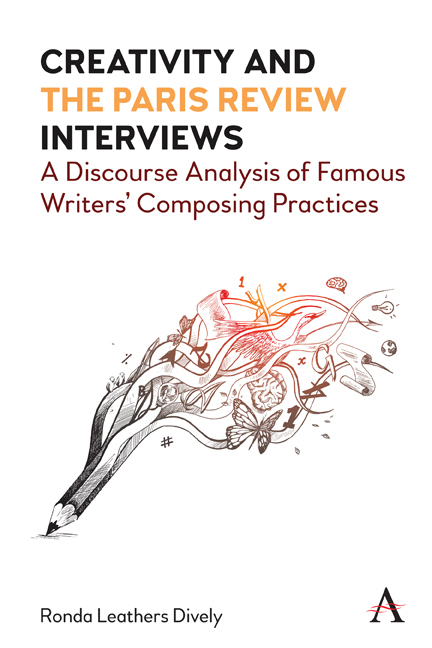 Creativity and 'the Paris Review' Interviews
Creativity and 'the Paris Review' Interviews Book contents
- Frontmatter
- Contents
- List of Illustrations
- Preface
- Acknowledgments
- 1 Impetus, Contexts and Methods
- 2 Composition through the Lens of Creativity Theory
- 3 First Insight, or the Glimmer of Possibility
- 4 Preparation, or Research Broadly Conceived
- 5 Incubation, or Breaks from Conscious Attention
- 6 Insight, or the Eureka Experience
- 7 Verification, or Evaluation
- 8 Emergent Patterns
- 9 Implications for Writing Instruction
- Appendix A Coding Table
- Appendix B List of Cited Paris Review Interviewees
- Appendix C Diagram of Analytical Categories, Subcategories and Themes
- References
- Index
1 - Impetus, Contexts and Methods
Published online by Cambridge University Press: 27 April 2022
- Frontmatter
- Contents
- List of Illustrations
- Preface
- Acknowledgments
- 1 Impetus, Contexts and Methods
- 2 Composition through the Lens of Creativity Theory
- 3 First Insight, or the Glimmer of Possibility
- 4 Preparation, or Research Broadly Conceived
- 5 Incubation, or Breaks from Conscious Attention
- 6 Insight, or the Eureka Experience
- 7 Verification, or Evaluation
- 8 Emergent Patterns
- 9 Implications for Writing Instruction
- Appendix A Coding Table
- Appendix B List of Cited Paris Review Interviewees
- Appendix C Diagram of Analytical Categories, Subcategories and Themes
- References
- Index
Summary
How can I improve my writing?
Why is writing so difficult?
How can I make it easier?
Most readers poised to engage this study have asked themselves these questions, even those who have enjoyed authorial success; moreover, those who mentor developing writers are bound to have faced such questions from their charges in one form or another. Responses to these questions are abundant and disparate regardless of genre or composing context, and they arise from a diversity of research lenses. One historically prolific lens is the study of writing processes—namely, reflecting on one's own processes and analyzing the processes of others. Pertinent to expository genres and composing contexts, the ultimate focus of this monograph, process considerations have long occupied the discipline of rhetoric and composition, early on in attempts to describe writers’ processes and identify patterns in their approaches to given writing acts and, later, in post-process warnings about the dangers of promoting a single set of steps that fits all individuals in all rhetorical situations. With due attention to post-process concerns, over time the discipline has come to take for granted that writers are most successful when they are cognizant of their own default composing practices (the effective and the ineffective) and when they have resources and opportunity to fuel experimentation with alternative strategies.
Working from this theoretical vantage point and with special concern for expository writing, the research informing this book poses possible answers to the questions asked at the outset of this chapter, but it pursues this aim through perhaps unexpected means—that is, analyzing established literary figures’ retrospective accounts of their own writing processes. While this perennially intriguing but insufficiently vetted resource of composing advice is applicable to creative writing in obvious ways, its relevance for expository discourse is, at best, underexplored. This seems unfortunate given the widely entertained assertion and central premise of this study that all writing, including expository writing, is creative, and that, therefore, famous authors’ commentary on what does and doesn't work when they are writing is potentially applicable in all composing situations.
Anecdotes about composing processes appear liberally in authors’ memoirs and in biographies they’ve inspired, and they are scattered through literary histories and composition scholarship. However, empirical treatments of such reflective discourse across authors—particularly, large subject pools of established authors—are sparse.
- Type
- Chapter
- Information
- Creativity and 'the Paris Review' InterviewsA Discourse Analysis of Famous Writers' Composing Practices, pp. 1 - 18Publisher: Anthem PressPrint publication year: 2022


